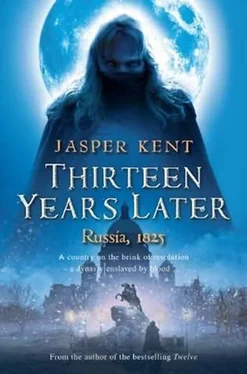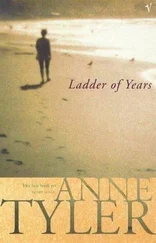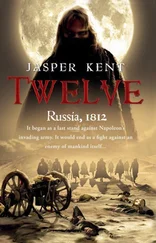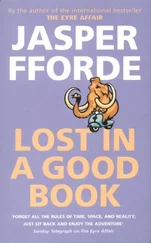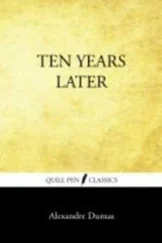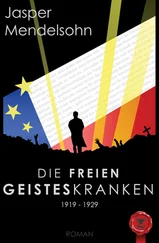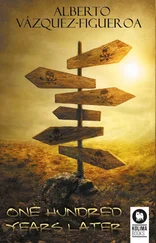It was no special gift; he knew many other musicians who spoke of the same sensation, something they could call to themselves almost at will. Lying in bed at night, it always came, but even in daylight, as Dmitry walked down the street, or in the middle of a conversation that did not interest him, he could summon it. The summons was his, but after that, the music was not his to master. He knew that it was a creation of his own mind, but he made no conscious decision as to its path or pattern. The composition was instinctive, as instinctive as hunger or lust or anger. He could neither prevent it nor control it.
But whenever the music came, it came only to tease him. In his life, Dmitry must have heard hundreds of hours – thousands – played inside his head, never repeating, never disappointing. But not a single note had ever made it out to be heard by any human ear. It was not influenced by consciousness and so, just as he could not direct it, neither could he analyse it, remember it, or even slow it down to a manageable tempo.
He had tried playing it at the keyboard; he had tried writing it down on paper. He had even attempted to sing it out loud so that another could transcribe it. But the music could not be contained. It fled on at its own pace, oblivious of the fact that in so doing it destroyed its own chances of immortality. Of course, he could pick out a note here and there, but what did that help? There were only twelve notes to choose from in total; the beauty did not lie within them but in their combination and permutation.
He pressed down on the keyboard and the chord sounded. It was a pleasant sound – melancholy, as a minor chord should be, but still harmonious. But it was not a new creation. It had no context, no before and no after to make it more than itself; a tableau that failed to tell the story of the play.
Dmitry lifted his fingers from the keyboard and the sound stopped. The music inside him had stopped too, not as he released the keys, but as he had first pressed them, banished as a ghost by its living cousin. It was always that way. But it must have gone somewhere. If only that place could be his fingers. He moved his right hand down the keyboard, still forming a C minor, but in a different inversion. All he needed to do was forget himself, to stop trying to listen to the music, to intercept it and capture it, instead simply to let it flow from him. He had attempted it so many times before, but he knew it would work one day – had to work. It didn’t matter if it was never written down, just to make the air vibrate for a few brief minutes to the sound of his music would be enough. And if that barrier could be broken, perhaps the rest would come easily.

He closed his eyes again and played. C minor. Then the same chord again. His hands moved up the keyboard – he had not asked them to – and played a G. Then C minor again, a diminished C and another G. His fingers moved as if they knew where they were going, through no direction of his; a diminished A now. The music began to smother him – control him. It was as if the harpsichord were dragging his creation from him, as though his blood were being drained from his veins, as though he were experiencing a slow, drawn-out orgasm that would leave him empty, as if the production of that music would kill him – and yet he did not want to stop. And the sound that he produced was wonderful. More than wonderful, it was sublime. It was brilliant. It was beautiful.
It was Beethoven. His hands moved of their own volition not out of inspiration but through repetition. He had played it so often during his life that now his hands knew it better than he did. Sonata in C minor, number 8 – the Pathétique. Of course it was wonderful, and brilliant, and beautiful. But it was not Dmitry’s. The one concept followed inescapably from the other.
He let his hands play on, drowning out the possibility of any of his own music entering his mind. His right hand scurried over the high notes while his left thumped out the low, rhythmic chords. It was not really a suitable piece for a harpsichord. His left hand frequently stabbed for a low note that didn’t exist on the short keyboard, but beyond that, the tone of the instrument was quite unsuitable for this stormy piece. He moved on to the allegro and played it far too fast, deliberately pushing himself to the limits of his technique. His left hand flickered over the bass tremolo like a trapped butterfly, while his right appeared merely to slap the keyboard repeatedly, but each time his fingers found the correct notes.
As he played he cursed his father, cursed him for being too mean to replace this ancient instrument with a pianoforte, cursed him for forcing him into the army, and above all for not believing precisely what Dmitry himself did not believe – that he could make a career as a musician.
His fingers moved ever faster, ignoring the faults in the instrument beneath them and the cramp that was developing in his forearms. At least, while they played, the sound of his own music could not return to taunt him.
Aleksei lay back in his chair and listened to the muffled sound of the harpsichord from across the hallway. Dmitry was showing off, he could tell, playing at that sort of speed. And what was wrong with that? He had plenty to show off with – enormous accuracy and dexterity. It wasn’t enough to make Dmitry into a great musician, but Aleksei hoped it was enough to make him happy. The very sound of it made Aleksei happy, made him for a moment forget those things that caused distress in his life.
He looked across the room at Marfa and smiled. She had been reading, but noticed his movement and looked up at him. She seemed embarrassed at his stare, and he was reminded of how she was more than twenty years ago, before they were married, when his glance at her across a crowded room would have caused her heart to pound and her face to flush behind the powder, little though he had been aware of it. Memories of his feelings for her back then began to push themselves into his mind, passionate feelings that had long since been replaced by mere affection – still more than many couples had left between them.
She returned his smile, and he wondered whether it was now in response to Vasiliy’s glance that her heart beat faster and her cheek reddened. When he was younger, when he had been in love with her, the thought of Vasiliy – of anyone with her – would have enraged him. He would have challenged Vasiliy to a duel and – had he survived, which he little doubted – he would then have cast Marfa aside, unable to forgive her. Did that show how much or how little he loved her? Would he have gone further? Had he loved her enough to kill her? Aleksei had faced that dilemma once, not with Marfa, but with another woman. He had not killed, but not for want of love.
Today, he had no urge to face a duel with Vasiliy, no desire to cast Marfa out of his home. Was he too forgiving, or was it mere indifference? He knew he should confront Marfa, if only to discover which of those two it was, if only to show her that he cared enough to object. But with Dmitry’s music filling the house, he felt too relaxed to be concerned with it now.
Even his concerns for the tsar’s safety seemed far from urgent. It had been almost two weeks since he had spoken to Aleksandr in the Nevsky Monastery. He smiled to himself. The last time he had gone there, it had been for a very different reason. He’d heard the story of an old monk who lived there – a monk who slept each night in a coffin. The implication was obvious, but Aleksei had been wise enough to test the theory before acting. A glimpse of the old man kneeling in prayer outside one of the chapels in the full glare of the sun had been ample evidence.
Читать дальше
